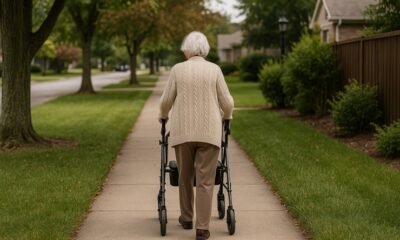Health
“I Thought Losing Weight Would Fix Everything”: The Mental Health Crash No One Talks About

Source: unsplash.com
People often see weight loss as the missing link to happiness. They picture confidence, love, ease in social settings—a new life, maybe. You think it’ll fix everything. But then you reach the goal. The clothes fit better, but the mind doesn’t follow. Instead of pride, you feel off. Empty even.
That crash is real. And common. While weight loss redefines your body, it doesn’t define your beliefs. If for years you have felt shame, worry, or doubt, that stigma does not disappear because your body takes up less space. When the expectation set by your body doesn’t match your lived experience, it can leave you feeling quietly disappointed. Let’s look at why that happens and how to recover emotionally once the number on the scale loses its grip.
The Myth of “Everything Will Be Better When I’m Thin”
We’re told thin equals happy. Ads, influencers, friends—they all sell that idea. You start to believe confidence lives in a smaller body. That once you’re thin, you’ll finally feel seen.
But our body image is layered. It builds up over time through judgment, comparison, and self-loathing. Weight loss might change the way others see your body, but it won’t rewrite the voice inside your head. If your self-worth rides on your appearance or approval, the high wears off quickly.
So, when people finally reach their goals and they find themselves still in a low place, it is not confusion, but clarity. The outside changed, not the inside story.
When Weight Loss Feels Like a Letdown
You’d think hitting a target weight would bring relief. Instead, it often stirs anxiety, sadness, or confusion. A few reasons stand out:
1. Your identity changes too fast.
You’ve spent years chasing this version of yourself. Then it happens, and you realize you don’t feel any more stable. Your body’s different, your habits shift, and even how people treat you shifts. It’s disorienting.
2. The validation dries up.
Compliments flood in early. Then they stop. And suddenly you feel invisible again. If that praise was your fuel, the silence hits hard. You might even start chasing more losses, hoping to bring it back.
3. Old problems stay the same.
Stress, loneliness, and conflict don’t vanish with the pounds. You just see them more clearly now that food or weight isn’t masking them.
4. Body dysmorphia lingers.
Many still see the “before” version in the mirror. The brain can take time to catch up. That disconnect can make progress feel hollow.
The Emotional Aftermath: What No One Warns You About
This stage can feel lonely. You should be proud, right? But something feels off. Common reactions include depression, emptiness, anxiety about regaining weight, or obsession with keeping control.
If that sounds familiar, you’re not broken. You’re adjusting. Losing weight doesn’t fix what drove the struggle; it just uncovers it. For some, deeper issues resurface here: disordered eating, compulsive habits, even addiction. That’s where professional help matters. Programs like PA Addiction Treatment guide people through emotional healing while rebuilding mental stability.
Healing Beyond the Scale
The real work starts when the goal shifts from being thin to being whole.
1. Redefine success.
Forget numbers. Ask, “How do I want to feel?” Strong, calm, energetic—whatever that means for you.
2. Face emotional triggers.
If you used food to cope, new tools are needed. Therapy, mindfulness, or programs such as Idaho Rehab Programs can teach healthy ways to process emotions.
3. Repair your relationship with food.
Fear and guilt often linger after strict diets. Intuitive eating helps rebuild trust with your body. Eat when you’re hungry, stop when you’re full, and let food be just food again.
4. Rebuild self-image.
Stop outsourcing approval. Compliment yourself for things unrelated to looks. It feels awkward at first, but it grows into real self-respect.
5. Find people who get it.
Connection helps. Communities focused on recovery and wellness, like Fresno Rehab, can provide genuine support through the emotional side of change.
When Professional Help Makes the Difference
Therapy isn’t weakness, it’s structure. Many find that talking to a counselor gives them space to reframe distorted thoughts and rediscover balance.
Centers such as Treatment Centers in Washington specialize in reconnecting body and mind, helping people heal from the inside out. When the root pain softens, everything else feels lighter.
Building a Life That Feels as Good as It Looks
Peace doesn’t come from smaller jeans. It comes from understanding yourself. You stop punishing your body and start listening to it.
Try this:
- Be grateful for what your body does every day.
- Set goals that have nothing to do with appearance.
- Surround yourself with people who care about your growth.
- Let go of perfection. Balance feels better anyway.
Losing weight might change your body. It won’t fix your mind. But that’s okay. Because once you start healing the part that’s been hurting all along, that’s when real freedom starts to show.
-

 Quotes3 years ago
Quotes3 years ago53 Motivational Gym Quotes to Fuel Your Workout
-

 Quotes10 years ago
Quotes10 years ago50 Most Powerful Quotes Ever Spoken
-

 Motivation5 years ago
Motivation5 years ago4 Fun New Hobbies To Try This Year
-

 Quotes1 month ago
Quotes1 month ago100 Motivational Quotes to Inspire You in 2026
-

 Quotes2 years ago
Quotes2 years ago43 Inspirational Quotes About Thoughts
-

 Quotes3 years ago
Quotes3 years ago105 Motivational Quotes by Famous People
-

 Quotes7 months ago
Quotes7 months ago100 Motivational Quotes to Start Your Day with Positivity
-

 Education1 year ago
Education1 year agoHow to Motivate Yourself to Study: 6 Proven Techniques






























